FOR IMMEDIATE RELEASE: August 14, 2017
Contact: Jacqueline Soto, 480-430-7511, Jacqueline@slentertainment.com
Guy Rubin, +86 10 8440 7162 guy@imperialtours.net
IMPERIAL TOURS GREAT WALL PRIVATE BANQUET RECOGNIZED AMONG TOP TRAVEL EXPERIENCES
Scottsdale, AZ – An experience offered by Imperial Tours was recognized as one of the top experiential travel offerings at the inaugural CHAD CLARK CERTIFIED 25, a first-of-its-kind travel initiative that annually lists the top 25 travel experiences or products throughout the world. The winners were announced in a special interactive event at the Bellagio in Las Vegas on August 13 in front of leading travel professionals.
Chad Clark, principal and owner of Chad Clark Travel Ventures, is a travel industry expert and self-described, “experience junkie,” who has spent years seeking out top-of-the-line travel experiences and services. Now, he is providing a platform for the best in travel to share theirs.
Clark aims to set the industry standard for luxury travel with the inauguration of the CHAD CLARK CERTIFIED 25, an elite list of the world’s most prestigious, authentic and unique travel experiences or products. Great Wall Private Banquet was among the first recipients of this prestigious honor.
“We are humbled and overwhelmed by the immense number of submissions we received from travel providers across the globe,” said Clark. “It is an honor and a thrill to unveil the very best in luxury travel through the CHAD CLARK CERTIFIED 25. This initiative provides travel suppliers with an opportunity to have their premium experiences recognized and promoted in an innovative way, while simultaneously connecting travel advisors, and ultimately travelers themselves, with exclusive, thoroughly vetted travel experiences that have an industry seal of approval.”
About the Great Wall Banquet
When we hear these days of the daunting logistical and financial challenges of building a wall across the southern border of the US, it brings home the magnificent achievement of the Chinese in resolving exactly these issues many centuries before as they built successive fortifications across their northern frontier to protect their agricultural heartlands from aggressive nomadic invaders from the north. These fortifications are known to us today as the Great Wall of China. The incredible experience we are presenting is the opportunity to walk the Great Wall with the British conservationist who was instrumental in developing the law to protect it, and then to enjoy a white linen banquet in a guard tower.
What astounds visitors about the Ming dynasty Great Wall (1368-1644) is its surprising beauty. Whereas the sections closest to Beijing are the largest with the most tourists, more remote sections benefit from fewer visitors and less renovation. The centuries-old 5 meter high “wild wall” – as conservationist William Lindesay calls it – these days does not dominate its surrounding landscape so much as delineate, define and embellish it. William will introduce his thirty year association with the Great Wall, starting with being the first foreigner ever to walk its entire length, to now when he is known through China as the Guardian of the Wall. After a thorough introduction to his efforts to improve its conservation, you will be taken to a remote spot to enjoy a remarkable banquet on the Great Wall of China.
About Chad Clark Travel Ventures
A self-proclaimed “experience junkie,” Clark gave up corporate life to follow his love for food, wine, culture, destinations, a.k.a. extraordinary travel experiences, and turn it into a business that helps people make the absolute most of their most precious commodity – their time.
Whether traveling with friends, family or alone on a research trip, Clark is all about the experience – and when he finds one he is passionate about, he just has to share it with his clients and friends. He and his company have the contacts, relationships and dedication necessary to ensure his clients have the best possible experiences. Clark has dedicated his life to travel and is amassing an ever-growing “Experience Journal” that he shares online through social media. Viewers can follow Clark through Rome, Sydney, Paris and even in his own backyard golfing in Scottsdale, Arizona. Clark and his team are committed to sampling, connecting, building relationships and, in essence, helping his clients live their next big adventure.
Chad Clark Travel Ventures works with people who recognize that the types of trips they want require more than time and planning – they require knowledge, experience and connections, all of which Clark and his team can provide.
Chad Clark Travel Ventures, an independent affiliate of Camelback Odyssey Travel – a Virtuoso® Member.
For more information on CHAD CLARK CERTIFIED 25, please visit www.chadclarkcertified.com.

Marketing China has never been more exciting, easy and profitable. As you may know Imperial Tours has partnered with Peninsula Hotels to bring you Peninsula Private Jet Tours Through China. Through this collaboration we have developed three bespoke travel experiences through China: Culture & Heritage, Family and Culinary. But what you may not know is that we have also developed a marketing plan designed to help you get the word out about these itineraries. Our Marketing Plan gives you the tools you need to promote and share Peninsula Private Jet Itineraries through multiple mediums. The idea behind sharing our marketing plan with you is to take the guesswork out of promoting these experiences. Essentially, let us do all the work for you and all you need to do is share!
These itineraries are packed full of once-in-a-lifetime experiences. If they are booked privately, itineraries can be further customized for alternative dates or embellished with different destinations, and if wished they can also be booked on commercial flights.
Our Marketing Calendar (click to download) is complete with step-by-step instructions on how to market and capitalize on each itinerary. All you have to do is follow five easy steps and let Imperial Tours do the rest.
Follow us on Twitter, Facebook and Instagram to get content on Peninsula Private Jet Tours that you can share with your followers.
Click to download our Marketing Calendar made especially for you. This calendar provides you with a detailed, easy to follow, marketing campaign that you can print out and follow to promote these tours. Additionally, our Marketing Calendar provides you with easy to follow instructions on how to repost and share from Facebook, Twitter, Instagram and E-blast.
Over the next 3 months, starting in November 2016, we will be sending out 3 e-blasts relating to a specific Peninsula Private Jet Itinerary; Culinary, Family and Culture & Heritage. Each e-blast will be created so that you can forward the information to anyone you think might be interested in one of these amazing experiences.
Each one of our 3 e-blasts will have a social share button that allows you to share each itinerary on Twitter, Facebook & Instagram. Simply click the social share button for each social icon and share!
After generating interest in each tour contact us to help you book one of these amazing journeys. Note: private tours based on these scheduled departures can fly commercial and be further customized.
Our Culinary Voyage e-blast will be sent shortly after American Thanksgiving. This one of a kind itinerary provides opportunities for your clients to try their hand at creating traditional Chinese dishes such as Peking duck, Dim Sum and even noodle throwing. China is a “must-eat” destination for all foodies; our Culinary Voyage is a 10-day tour highlighting the best eats China has to offer. Our culinary tour is ideal for groups of 8 or less. Tours are approximately USD$26,050* per person based on double occupancy. To view a detailed itinerary click here.
Our Family Tour e-blast will be sent in early December, in time for Christmas as the perfect once-in-a-life-time holiday gift for the whole family. This 11-day tour showcases the best of China in a safe and family-friendly interactive setting. This tour is ideal for small to medium sized families who are looking for a unique holiday experience and enjoyment for the whole family. Tours begin at approximately USD$102,120* per family of 4. To view a detailed itinerary click here.
Our Culture & Heritage itinerary will be sent out after the New Year and is equipped with unparalleled access to some of China’s most significant cultural artifacts as well as leading creative minds shaping China’s artistic landscape. This 10-day tour will introduce you to private collections and VIP access to China’s cultural treasures. This tour is ideal for clients who are looking for exclusive access to all that China has to offer. This tour is suitable for small groups as well as families. Pricing begins at approximately USD$25,530* per person based on double occupancy. To view a detailed itinerary click here.
*Price is subject to change based on fluctuating exchange rates.

Agent Cathy Dorton at the Great Wall during the Nov. 2015 FAM
Imperial Tours has been running its innovative China Expert Training Program for travel agents since 2010. A number of agents have graduated as China Experts from our free webinar course run once a year. The four-part webinar series arms you with in-depth information about China covering hotels, tour sites, restaurants, shopping, seasonality, and unique experiences so that you can be confident in selling luxury China to your clients.
We asked one of our recent China Expert graduates, Travel Expert agent Cathy Dorton based in Tennessee, how the training benefited her. Here is what she said:
‘‘Having never been to China, the sales process has sometimes been a bit difficult for me. When my VIP clients contacted me requesting a "WOW me trip", it was requested that I send over 2 – 3 proposals. I graduated from the China Experts course on 04th March 2015, and this was somewhere along March 10th time frame. Following my completion of the Imperial Tours China Expert course I immediately had the knowledge and confidence to craft a mind-blowing itinerary!
Working together with Imperial Tours’ knowledgeable specialists and in collaboration, we immediately crafted that "WOW" proposal together and presented it to my clients for review (a family of 4) along with two other destinations. The clients’ entire family chose China, hands down – largely based on those "Imperial Moments" we presented. I booked their travel immediately, and they left the USA first week of May 2015! So, literally within 6 weeks of becoming an Imperia Tours China Expert, I had my first sale!
The feedback from my client and family consisted of "1. Best trip we have ever done! 2. Couldn't believe everything we had access to. 3. My hotel arrangements throughout the trip were superb – our favorite was the Banyan Tree Yangshuo… until we arrived at the Amanfayun Resort in Hangzhou, where we were immersed into the regional customs and relaxation of the property – was so, so needed for my family. 4. Rafting experience on the Li River was cancelled, due to flood levels on the day we were scheduled; not only did our guide, David, do all possible to make sure we had an amazing day… he also, unexpectedly returned the following morning to make sure they were able to have the Li River rafting experience!"
Very high marks for Imperial Tours China Expert Program – I leave October 28th for my FAM with Imperial Tours, and am happy to report due to my immediate sale, I received a nice discount on my trip! I’m working now towards my MASTERS Level, and highly recommend to other agents with a desire to really continue their education, to participate in the China Experts Yearly Program with Imperial Tours.’’
If you, too, are interested in becoming a China Expert, then our next training courses will be held in January 2016 for North American-based travel agents, March 2016 for European-based agents and April 2016 for Spanish speaking agents (training will be conducted in Spanish). Each of the four webinars lasts about an hour and you are required to complete a mini test after each session. Graduates of the program receive:
· An Imperial Tours China Expert certificate to hang on your wall (think of it more as a silk scroll)
· An Imperial Tours China Expert logo to use on your email signature and/or your website
· 10% off our bi-annual Fam trips (or greater discounts as you reach certain revenue milestones)
· A waiving of our itinerary design deposit
· A 3-year listing of your name, brief bio and contact information on the Find a Travel Agent page of our website for opportunities for referrals.
Make it your New Year’s resolution to learn more about China and you will benefit from both the knowledge and the perks.
To register for the North American training taking place Jan 13, Jan 20, Jan 27, and Feb 3 at 4:30pm EST, please click here.
To register for the European training taking place Mar 9, Mar 16, Mar 23, and Mar 30 at 11am GMT, please click here.
For the April Spanish-language training, please email us.

Exterior view of The Temple House
Last week Guy and I were lucky enough to be invited by The Temple House Hotel to visit the vibrant city of Chengdu, the capital of Sichuan Province and gateway to Western China. Most people think of pandas when they think of Chengdu and indeed, this is the home of the adorable Giant Panda. With the opening of The Temple House, however, witnessing the rise of one of China’s most exciting cities will make the experience that much more enjoyable.
The Temple House is the third of Swire’s ultra-chic boutique, “House” hotels (Upper House in Hong Kong, Opposite House in Beijing). The reason for the name is that the development, consisting of the hotel, residences, shops and restaurants is located in the area of Daci Temple. In fact, the entrance to the hotel is cleverly designed so that one walks through a Qing dynasty (1644-1911/12) courtyard in what used be to the study rooms of Confucian scholars. Some of the rooms have now been converted to a contemporary art gallery featuring Sichuanese artists. One is then taken through to the beautifully designed lobby and the hotel high rise beyond.
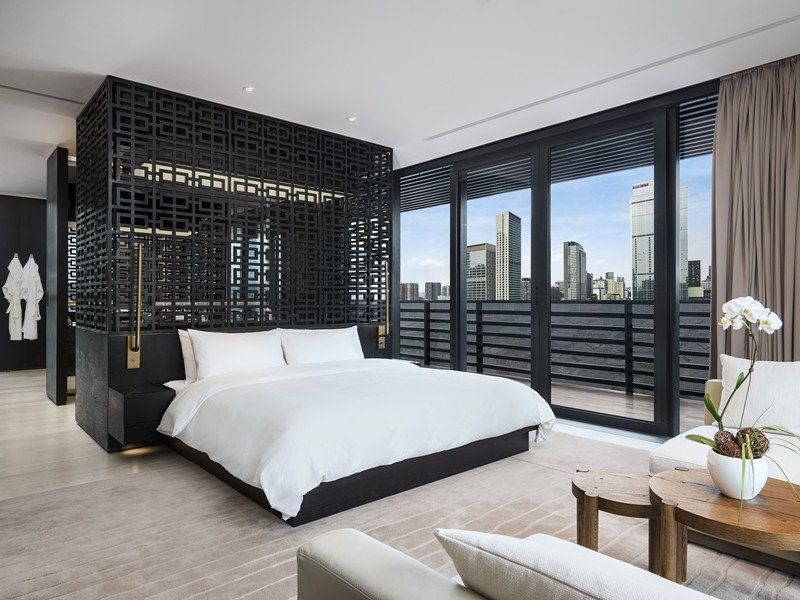
Studio 90 at The Temple House
Rooms start at a generous 60 sqm (Studio 60), or 646 square feet, and design is again foremost, but the style is warm and welcoming. Even the entry level room has a sitting area and the bathroom and dressing room are cleverly designed for maximum use of space. The next level up from the studios is the Temple Suite (90 sqm or 970 square feet), consisting of a sitting area and bedroom that can be closed off. The bedroom might feel a bit cramped to some, so suite guests may prefer the Studio 90 which is equal in size but without the partition between the living room and bedroom.
There is a fantastic swimming pool and gym, both with natural light. Another fabulous space is the spa, which is again housed around an historic courtyard. While the spa lacks a steam and sauna area, it doesn’t get much better than sitting in an ancient courtyard with beautiful trees both before and after the treatment. The treatment rooms, of course, have every modern amenity and the massages, using organic products from Australia, were flawless.
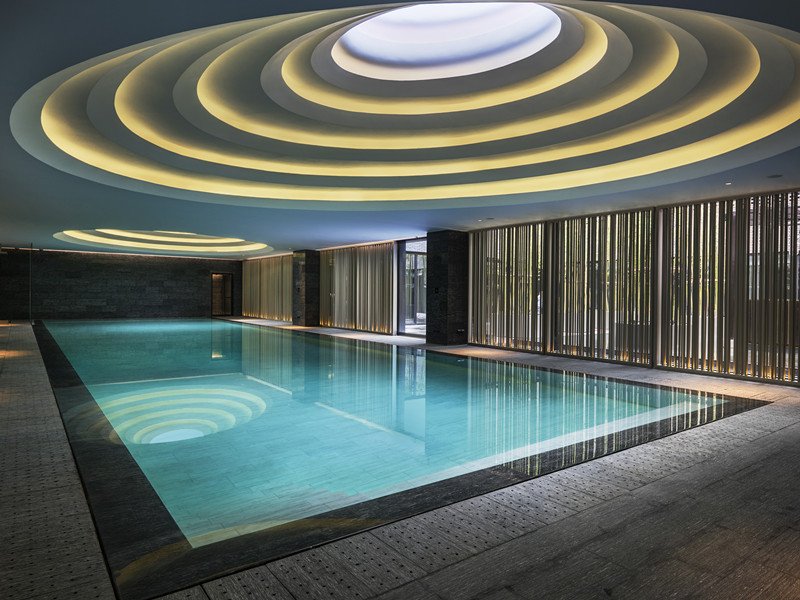
Swimming pool at The Temple House
Then there are the restaurants. Breakfast is served in Temple Café, serving a wide range of international cuisine. This is not a place just for hotel guests. In the afternoon and evening, it’s crowded with Chengdu’s glamorous set who stop in for high tea. Speaking of tea, the Teahouse is a dedicated tea house serving over a hundred varieties of tea and a menu that looks as though it has taken years to research and compile. They also serve light vegetarian food, tapas-style, perfect for those who don’t want a big lunch. Tivano is then the hotel’s upscale Italian; again a place to be seen.
One can’t discuss The Temple House without mentioning the Taikoo Li development, a “bustling urban lifestyle hub” which is also owned by Swire. There are more than a dozen restaurants, bars and all the luxury brands that one can dream of. What’s most interesting is that the place is packed with Chengdu locals, who are dressed to the hilt, enjoying themselves eating, chatting and shopping…don’t tell them that there is an economic downturn in China!
Contact us to design a private, customized itinerary which includes Chengdu and a stay at The Temple House.

When Rubin moved to China, in 1994, he was surprised to find a dearth of resources for discerning travelers in a country so rich in cultural heritage and natural beauty. He and his wife and partner, Nancy Kim, set out to change that, and they now lead China’s most sophisticated luxury tour operator. To keep up with the country’s rapid transformation, Rubin is constantly inspecting new hotels—Chengdu has recently seen the arrival of the Ritz-Carlton, St. Regis, Temple House, and Six Senses—and planning new excursions. In Hangzhou, he can set up a visit to a pharmacy with a practitioner of Chinese medicine; in Shanghai, he’ll arrange a nightlife tour that explores the jazz scene.
Trend watch: Long favored by backpackers, the city of Lijiang in southwestern China, at the Himalayan foothills, is now attracting high-end hotels such as the new Amandayan. The property incorporates Yunnan’s indigenous Nakhi design and has panoramic views thanks to its hilltop location. Lijiang’s tourism bureau understands the city’s potential as well. Rubin notes, “There are strict rules about architecture—what can and cannot be built—and they have bike lanes.”
"Everything seemed to happen without any effort: flight reservations, hotel check-in, sightseeing and time for shopping – everything made to order for us, knowing perfectly to accommodate our different interests and needs. Many thanks to our China Host – who made the difference between Excellence and Perfection."
The Garza Family, Mexico
My wife and partner Nancy Kim and I did not hail from the travel industry when we started Imperial Tours over 15 years ago. We didn’t have preconceived notions of what should and should not be done. Instead we compared what we would wish to enjoy as part of a private tour with what then existed. One of our more innovative formulations was introducing the role of the China Host. This is a Chinese-speaking Western concierge cum cultural attaché, who travels with parties from as small as one person on their vacation around China. This had not been done before and after using this service, guests frequently urge Imperial Tours to introduce the same concept to other parts of the world.
However, a China Host has more value in China than in other countries because of the distances involved. I do not mean geographic distances, for example the distance in traveling between Wyoming and Beijing, but refer to a multiplicity of enormous gaps that exist between a Western visitor and their experience of China. More often than not, these are political, cultural, linguistic and logistical in nature.
A China Host acts as a bridge to span the chasms in each of these dimensions; originally Western with many years’ residency in China and fluency in Mandarin Chinese, the China Host is perfectly placed to interpret China for a visitor. Whilst a Chinese guide can relate objective information such as the history of China and the development of contemporary life, he or she is subject to exactly the same limiting cultural and ideological divide as the visiting guest, and so is limited in helping visitors understand China. It is the China Host who is well placed to do so, clarifying the sometimes confusing machinations of this politically different country. Similarly, he is well-placed to explain the interactions of a Communist/Confucianist society, for example in describing the operations of the marriage market outside the Temple of Heaven in Beijing. Through using the China Host as this kind of resource, the traveler profits from a deep and up-to-date appreciation of the Middle Kingdom.
In addition, thanks to the linguistic and logistical prowess of the China Host, the vacation becomes less about negotiating a holiday in an exotic and unfamiliar country than about understanding, learning about and enjoying the destination. Anxiety is displaced by curiosity, hesitation by enthusiasm, temptation by implementation. The China Host liberates the traveler from the hassles of organizing travel to empowering her to implement instantaneous improvements. So, when the traveling party wishes to eat Sichuanese instead of Western food that evening, wishes to change hotels to explore the mountain top rather than staying at the base of Yellow Mountain, or else wants to extend a night in Hangzhou, that is when the China Host effortlessly plugs the gap to make it happen immediately.
Any luxury travel company has its store of guests’ unusual requirements, for example the China Host that had to organize a visit to a pebble-cooled nuclear reactor or the one required to interpret for a holidaying senator when the provincial governor decided to televise their evening get-together, but these heroics pale beside the everyday contributions that make up a China Host’s daily role. This could be organizing an impromptu soccer game with local villagers for a large traveling family, inspiring a young traveler to take up Chinese when they return home, or else putting together a once-in-a-lifetime marriage proposal on the side of a snow-capped Tibetan mountain for a romancing couple. These are some of the life-changing experiences fueled by Imperial Tours’ unique China Hosts.
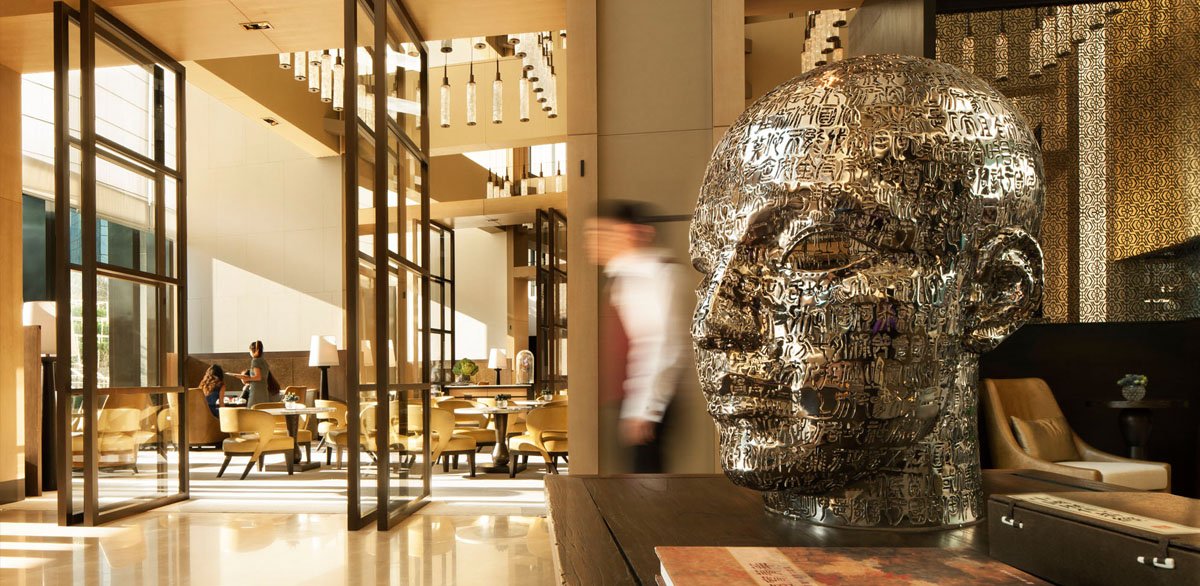
Shortly after its opening my family and I stayed at the Rosewood Beijing, the city’s newest luxury urban hotel.
While located in a busy area with lots of traffic, they did an excellent job of sheltering the entrance from the chaos outside. The lobby is well designed and feels relaxing. The decor is contemporary, sleek and quite masculine with muted tones and straight lines, so in many ways it has more of a business hotel look and feel rather than that of a leisure escape. The artwork won’t be to everyone’s tastes, but some of it is quite impressive.
We were in a Manor Suite connecting to a Deluxe Room. The Deluxe Rooms at 46 sqm (just shy of 500 square feet) are quite spacious. It is worth noting that the Manor Suite only has one sink while all other suites have two.
Rosewood takes up the first through 23rd floors of the building, so the views aren’t as sweeping as what you’d get at a couple of the other luxury properties in the city. Views from the Deluxe Rooms look out onto an unattractive apartment building, so we would suggest upgrading for more interesting vistas.
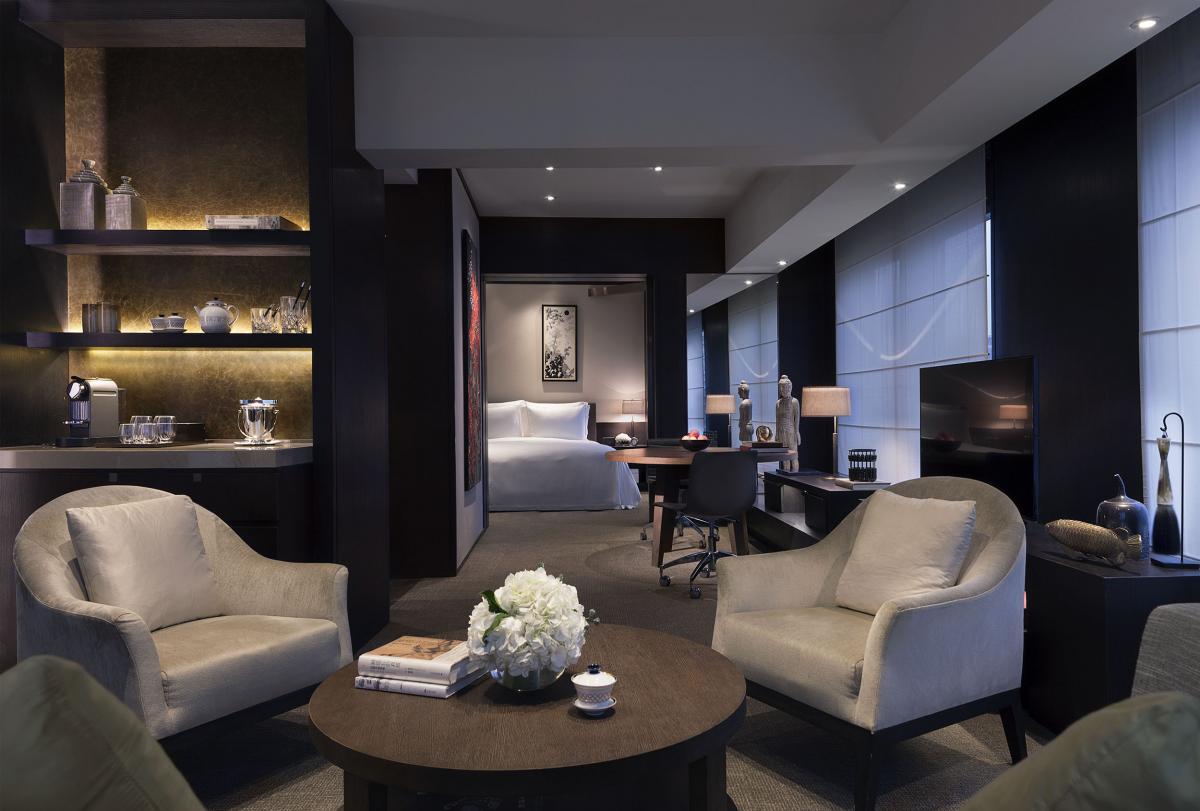
The public areas are very nice. There is a spacious and beautiful club lounge where breakfast is plentiful, complete with an egg station. The main lounge leads into a reading nook with welcoming leather sofas and a pool table.
The restaurants have innovative features like large floor-to-ceiling cold cellars for juices, yogurt and sushi. Country Kitchen, a restaurant serving Northern Chinese cuisine, has a lively atmosphere and fun open kitchens with a large variety of noodle options. Impressively, their Peking Duck was as good as that at Made in China, one of our favorites. There is also the promising potential for the opening of an external hotpot restaurant in the near future.
The spa, which was not yet open during our stay, has a nice juice bar. The pool is fantastic with lots of natural light and greenery but toys for the kids were lacking. Other than that, service was good overall.
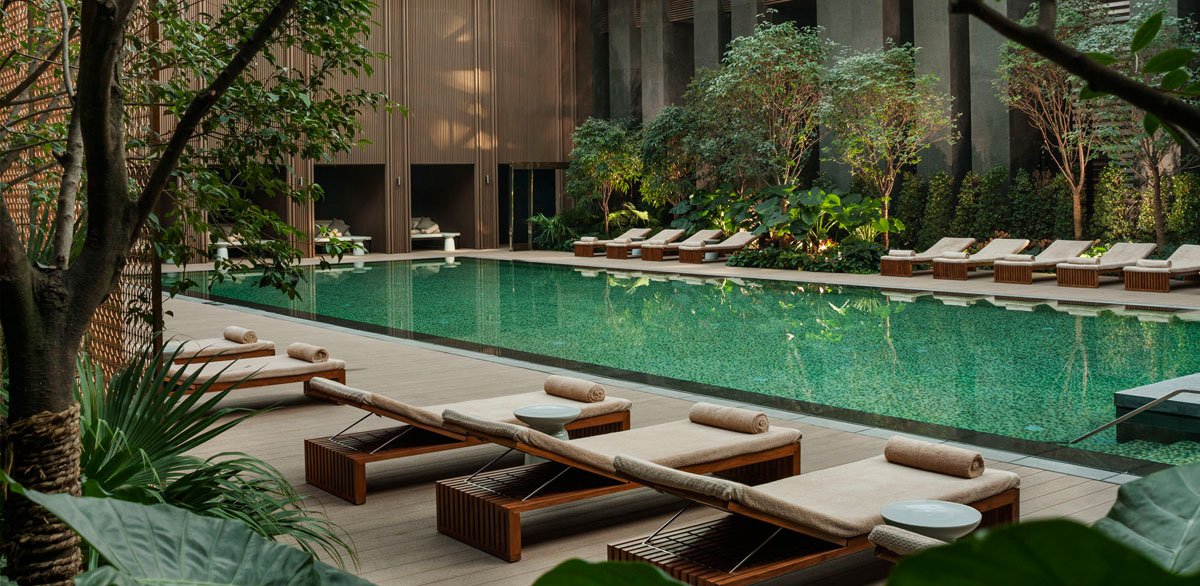
At the moment it is too early to know how the Rosewood Beijing will compete with other Beijing properties like the Four Seasons and Shangri-la’s China World Summit Wing, but they are competitively priced and there is no denying potential. See for yourself by booking a stay at the Rosewood Beijing with Imperial Tours here.
(Photos: Rosewood Hotels)

It’s wonderful when the Aman magic conjures up a gem. Amandayan, their new property, makes Lijiang. It does a wonderful job of interpreting the local architectural idiom to create a jewel of a 35 room hotel atop Lion Hill overlooking Lijiang old town, this destination’s most important cultural site. Whilst some guests might be disturbed in the evening by noise from the boisterous bars below until the official curfew of 11pm, the view of the old town from the hotel terrace and tea room more than compensates. The rooms are distributed between 5 two-floored courtyards built in traditional Naxi style mostly facing the old town. (The view the other way to Lijiang new town is an eyesore, so avoid rooms facing this direction.)
This is the third Aman in China. It opened only a month or so before my recent March stay (the hard opening is in May, 2015), and it is bitter sweet for me to record that the service was wonderful. Has the organization learned through the tribulations of its first two properties how best to approach a hotel opening in China, is it thanks to the efforts of genial former GM, VP (Vaipanya Kongkwanyuen), and the new GM, Nicolas Ilickovic, or is it the accidental result of a fortuitous set of circumstances? I don’t know but surely welcome the calm reassurance of the staff. We were spoiled rotten by the attentions of James Bao, by the rich cultural depth of the accommodation and the pleasing quality of Chef Steven Miao’s food. Though our coffees seemed to take an age to arrive for the morning breakfast, if anything portions were over-generous and our ravenous lion of an 8 year old found it challenging to eat his way through the Chinese breakfast set, a portion of which in the end served to feed three persons. For dinner, the best thing we ate was a local truffle used to flavor tofu with porcini mushrooms and also very much enjoyed a local steamed fish. While mother twists her mouth at praline-filled choux pastry, the kids wolfed Chef Miao’s Paris-Brest before any objection could be raised to them.
Life is sweet at Amandayan. Leaving it to explore Lijiang on this visit, I was impressed how the local government is delivering on the sustainable development of its area by insisting on local construction in the traditional style. Would I have felt so positive had I been staying at another property in this fast-developing destination? I’m not so sure. It’s definitely worth the extra expense, and I merely hope that Aman does not price itself out of most peoples’ pocketbook.
Es jueves en la noche y se está haciendo tarde. Tienes que terminar un itinerario FIT bastante complicado antes de irte de la oficina, así que pides comida china a domicilio y te concentras para terminar el trabajo. El cielo se está oscureciendo del otro lado de la ventana cuando de repente se ve un destello cegador de luz y un platillo volador desciende en picada desde el firmamento nocturno para sobrevolar hasta detenerse afuera de tu oficina. Sale una plataforma de acero, se abre una puerta y un alienígena rojo y verde se arrastra como un caracol gigante por la plataforma y hasta tu oficina.
“Encontré su agencia en internet cuando iba saliendo del hiperespacio, y me preguntaba si podrían ayudarme con una duda sobre viajes”, explica el alienígena usando una aplicación para traducir. Sorprendido y boquiabierto, no aciertas a decir nada. El alienígena continúa: “Voy en un viaje intergaláctico y sólo tengo 10 días para estar en su planeta. No quiero apresurarme innecesariamente. Tengo a mi esposa e hijos en la parte trasera de la nave y les quiero enseñar lo mejor de la Tierra. Es nuestra primera vez aquí. Mis amigos me dijeron que tanto Italia como China han tenido un impacto enorme en su civilización, así que quería pedirles que me aconsejaran acerca de cuál debería visitar”.
Antes de que puedas decir nada, tu colega responde: “Durante los últimos treinta años Italia ha sido un éxito entre los terrícolas, de manera que la conocemos como la palma de la mano. En cambio, China es un tanto desconocida para nosotros, así que le recomendaríamos mucho Italia para sus primeros diez días en nuestro planeta”.
“Esperaba que me dijeran eso”, responde el alienígena con cara de saberlo todo, “porque estaba revisando los datos y vi que la mayoría de las agencias de viajes de lujo venden entre cincuenta y sesenta veces más viajes a Italia que a China. Lo que recomiendan concuerda con los últimos treinta años de sus ventas de viajes. Lo que pasa es que no siento que sea tan sencillo como eso. Después de todo, tanto China como Italia tienen paisajes hermosos, cocinas sorprendentes, gente amigable e impresionantes sitios culturales. Pero conforme volábamos hacia acá, mi esposa también se puso a ver y miró el precio del Cipriani. ¡¿Saben cuánto cuesta una habitación básica?! Mientras que el Península Shanghái, que ganó como el mejor hotel de Virtuoso hace dos años, cobra una fracción de ese precio… También checamos el tamaño promedio de las habitaciones en el Hotel de Russie en Roma y lo comparamos con el del Shangri-la China World Summit Wing en Beijing… ¿saben cuál es la diferencia? Y luego mi hija encontró esta fabulosa compañía que se llama Imperial Tours que hace toda clase de cosas increíbles, como banquetes en la Gran Muralla o un paseo en góndola privada con orquesta en el Lago oeste de Hangzhou. Me preguntó cuánto costaría organizar un banquete en el Coliseo y si las leyes sindicales permitirían una orquesta en una góndola en Venecia. Nos pareció que China sería entre 40 y 50% más barato que Italia con servicios equivalentes, ofreciendo el mismo nivel de calidad y experiencias igual de sorprendentes.
En ese momento suena el timbre y entra el repartidor de comida china, que trae tu pedido. “No pude evitar escuchar su conversación desde afuera”, comienza. Y dirigiéndose a la alienígena, añade: “Hay algo que tiene China e Italia no, ni Francia, ni el Reino Unido, ni Suiza, ni el resto de los destinos más vendidos de esta agencia”.
“¿Qué cosa?”, pregunta el alíen.
“El futuro”, responde.
Luego, volteándose hacia ti y tu colega, continúa: “y hay algo más que quizá no sepan. Según los datos de Virtuoso, un consorcio de viajes de lujo, los agentes de viajes ganan en promedio 2.3 veces más, en ventas a China que en otros destinos porque la gente va por más tiempo y por lo general requieren más servicios cuando están ahí”.
—
Así que la pregunta ahora es: ¿en qué parte de la historia quieres estar? ¿Quieres seguir reflejando lo que ha pasado en el planeta Tierra durante los últimos 30 años o quieres estar en el lado correcto, el del futuro, e invertir en aprender acerca de China?

Guy Rubin of Beijing-based Imperial Tours talks about the latest trends in China in travel, including the emergence of Lhasa as a hot destination.
See full interview here